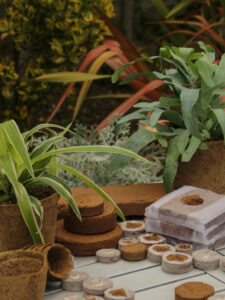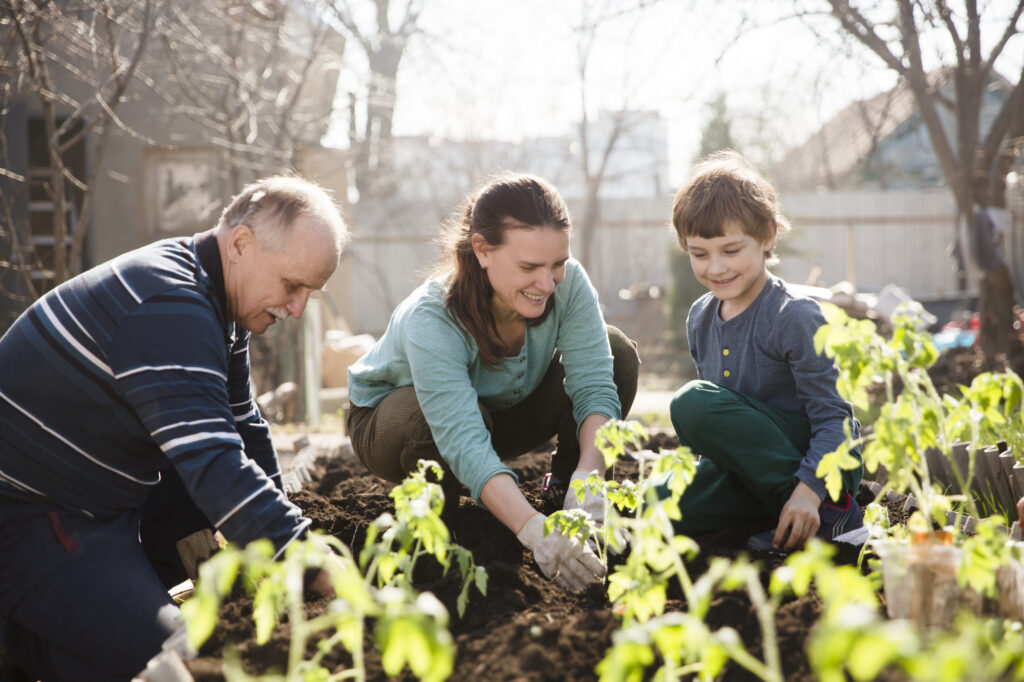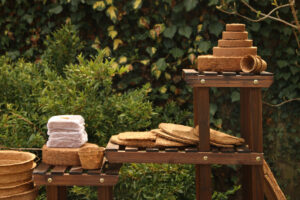This week is National Allotments Week. An initiative of the National Allotment Society, this year’s theme, ‘bugs, bees, and broccoli’, highlights the importance of gardening with nature in mind.
Allotments not only help individuals benefit from growing their own fruits and vegetables, but it is also a great way to live healthier lifestyles. The practice of allotments dates back hundreds of years. Yet, in recent times, especially in the midst of the pandemic, there has been renewed interest in gardening and allotments. In this blog post, we trace the origins of allotments, how the popularity of allotments have grown over the years, and adopting more sustainable practices in your allotments.
Tracing the origins of allotments
Evidence of allotments dates back to the Anglo-Saxon times. Saxons would clear some field from woodland, that was then held in common.
But the allotment system as we know today takes roots in the 19th Century. During this time, land was given to the labouring poor so that they could grow food, which was needed with rapid industrialisation.
Allotments during the World Wars
During the World Wars, with blockades and food shortages, there was increased demand for allotments. With the First World War, land that was not large enough for general agricultural use, but was ideal for allotments, was owned by railway companies and allotted to railway workers, which is why you might see allotments by railway lines.
Later, the Dig for Victory campaign set up during World War II in Britain encouraged people across the country to grow their own food amidst harsh rationing. Open spaces, from domestic gardens to parks, were transformed into allotments. In fact, it is reported that during WWII, around 18% of fruits and vegetables grown in the country were those grown in gardens and allotments.
Changing interests in allotments
However, in the years following the end of World War II, interest in allotments declined, amidst factors such as cheap and readily available mass produced food and busier lives.
Over the years, many legislatures were introduced that helped strengthen the rights of allotment holders and protect allotments.
More recently, allotment spots have begun to fill with rising concerns about the food we eat, amidst issues such as chemical pollution and contamination of our food. Allotments are not only important sites of food production, but vital for the future of our planet.
Allotments and gardening amidst the pandemic
The wider benefits of allotments and gardening, as well as spending time in nature, were more acutely felt during the pandemic. Not only were they beneficial to stay physically active, but hugely important for an individual’s mental health and wellbeing.
The therapeutic effects of gardening are widely known. Studies have shown how gardening can help reduce stress and improve one’s self-esteem. At CoirProducts, we have continued to highlight the importance of allotments and gardening for one’s overall health and wellbeing by sharing inspiring stories of individuals as well as charities and other organisations.
Allotments and productivity
Back in 2014, a study showed how allotments could play a key role in sustainable farming. Conducted by the University of Sheffield, this study highlighted how allotments could help meet the rising demand for food, without damaging the soil on which food production depends. Sustainable farming methods used by a majority of allotment holders such as composting their allotment waste were among the factors that helped maintain the health of the soil.
More recently, a pilot study conducted in 2021 in Brighton and Hove found that urban allotments could be as productive as conventional farms. The study showed how growers were able to ‘harvest 1kg of insect-pollinated fruit and vegetables per sq metre in a season’. The study also noted that urban growers recorded over 2000 pollinating insects among their crops.
The importance of allotments for biodiversity
Allotments and gardens are important sources of biodiversity, and protecting the various insects, birds, and wildlife found in these spaces is important. As the National Allotment Society states, “an allotment plot is a complex web of plants, micro-organisms, fungi, insects and animals that not only produces food but also supports eco-system services such as pollination and offers a refuge for wildlife in urban areas.”
Starting your own allotment
If you are new to gardening, starting off on your allotment journey can be both exciting and daunting. Begin by clearing the plot of weeds and unwanted material and debris. Tidy unwanted surface growth and grass. You can of course use any excess plant, leaves, and other green matter as mulch. But do be aware that the long grass is beneficial for wildlife, so tread lightly before trimming it off. Check for hedgehogs, slow worms, caterpillars, and chrysalises, among others.
Plan out your plot. Think about how you might want to use it throughout the year, make it practical. See if you can have a mix of vertical and horizontal growing to make the most of the space available. Other factors to consider can include aspects such as how much sun or shade the plot receives, and access to water.
How CoirProducts can help with sustainable growing
At CoirProducts, we provide a wide and innovative range of coir-based products to help you with your allotment. Made out of the natural fibrous material extracted from the husk of the coconut, coir is a natural, organic, and biodegradable material. We are also directly involved in the manufacturing process, and all our products are produced with minimal harm on the environment.
Coir is also free of the more harmful peat-moss. Peat moss has been one of the popular ingredients used by gardeners and growers in compost mixes and sowing. Yet, the harvesting of peat bogs has had serious impacts on climate change, with the UK government taking steps to ban the sale of peat in horticulture.
If you are looking for an eco-friendly growing medium, at CoirProducts, our coir potting mix comes in a variety of sizes of blocks, bricks, and discs, with each product giving you a specific volume of coir when expanded (by adding water). CoirProducts coircoins are ideal for sowing a variety of seeds and for root cuttings, and are known for their high germination rates.
CoirProducts coir pots come in a distinct range of sizes from 5cm to 28m, with the smaller pots ideal for sowing and the bigger pots suitable for larger plants. They are also the perfect alternative to plastic pots. CoirProducts mulch mats are particularly useful for blocking sunlight and preventing the growth of unwanted weeds in your gardens, while CoirProducts grow poles or moss poles are the perfect aid for those creepers. Our range of coir-based growbags are also ideal for growing crops like tomatoes.
At CoirProducts, we also offer a unique array of peat-free coir bundles. Combining a selection of our products, these specially curated bundles are ideal whether you are a seasoned gardener or new to using coir.
Key advantages of coir include its ability to retain water and moisture well, which helps produce strong and healthy root systems. Coir-based products also provide excellent drainage, preventing plant flooding, while coir also decomposes slowly and can withstand compression better than peat.
And of course, allotments are great ways to get children involved in growing too.




